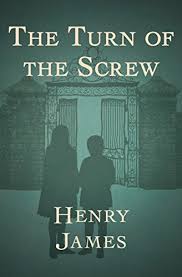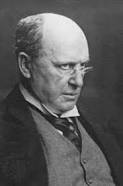The Turn of the Screw Page #7
The Turn of the Screw is an 1898 horror novella by Henry James that first appeared in serial format in Collier's Weekly magazine. In October 1898 it appeared in The Two Magics, a book published by Macmillan in New York City and Heinemann in London.
IV It was not that I didn’t wait, on this occasion, for more, for I was rooted as deeply as I was shaken. Was there a “secret” at Bly—a mystery of Udolpho or an insane, an unmentionable relative kept in unsuspected confinement? I can’t say how long I turned it over, or how long, in a confusion of curiosity and dread, I remained where I had had my collision; I only recall that when I re-entered the house darkness had quite closed in. Agitation, in the interval, certainly had held me and driven me, for I must, in circling about the place, have walked three miles; but I was to be, later on, so much more overwhelmed that this mere dawn of alarm was a comparatively human chill. The most singular part of it, in fact—singular as the rest had been—was the part I became, in the hall, aware of in meeting Mrs. Grose. This picture comes back to me in the general train—the impression, as I received it on my return, of the wide white panelled space, bright in the lamplight and with its portraits and red carpet, and of the good surprised look of my friend, which immediately told me she had missed me. It came to me straightway, under her contact, that, with plain heartiness, mere relieved anxiety at my appearance, she knew nothing whatever that could bear upon the incident I had there ready for her. I had not suspected in advance that her comfortable face would pull me up, and I somehow measured the importance of what I had seen by my thus finding myself hesitate to mention it. Scarce anything in the whole history seems to me so odd as this fact that my real beginning of fear was one, as I may say, with the instinct of sparing my companion. On the spot, accordingly, in the pleasant hall and with her eyes on me, I, for a reason that I couldn’t then have phrased, achieved an inward resolution—offered a vague pretext for my lateness and, with the plea of the beauty of the night and of the heavy dew and wet feet, went as soon as possible to my room. Here it was another affair; here, for many days after, it was a queer affair enough. There were hours, from day to day—or at least there were moments, snatched even from clear duties—when I had to shut myself up to think. It was not so much yet that I was more nervous than I could bear to be as that I was remarkably afraid of becoming so; for the truth I had now to turn over was, simply and clearly, the truth that I could arrive at no account whatever of the visitor with whom I had been so inexplicably and yet, as it seemed to me, so intimately concerned. It took little time to see that I could sound without forms of inquiry and without exciting remark any domestic complications. The shock I had suffered must have sharpened all my senses; I felt sure, at the end of three days and as the result of mere closer attention, that I had not been practiced upon by the servants nor made the object of any “game.” Of whatever it was that I knew, nothing was known around me. There was but one sane inference: someone had taken a liberty rather gross. That was what, repeatedly, I dipped into my room and locked the door to say to myself. We had been, collectively, subject to an intrusion; some unscrupulous traveler, curious in old houses, had made his way in unobserved, enjoyed the prospect from the best point of view, and then stolen out as he came. If he had given me such a bold hard stare, that was but a part of his indiscretion. The good thing, after all, was that we should surely see no more of him. This was not so good a thing, I admit, as not to leave me to judge that what, essentially, made nothing else much signify was simply my charming work. My charming work was just my life with Miles and Flora, and through nothing could I so like it as through feeling that I could throw myself into it in trouble. The attraction of my small charges was a constant joy, leading me to wonder afresh at the vanity of my original fears, the distaste I had begun by entertaining for the probable gray prose of my office. There was to be no gray prose, it appeared, and no long grind; so how could work not be charming that presented itself as daily beauty? It was all the romance of the nursery and the poetry of the schoolroom. I don’t mean by this, of course, that we studied only fiction and verse; I mean I can express no otherwise the sort of interest my companions inspired. How can I describe that except by saying that instead of growing used to them—and it’s a marvel for a governess: I call the sisterhood to witness!—I made constant fresh discoveries. There was one direction, assuredly, in which these discoveries stopped: deep obscurity continued to cover the region of the boy’s conduct at school. It had been promptly given me, I have noted, to face that mystery without a pang. Perhaps even it would be nearer the truth to say that—without a word—he himself had cleared it up. He had made the whole charge absurd. My conclusion bloomed there with the real rose flush of his innocence: he was only too fine and fair for the little horrid, unclean school-world, and he had paid a price for it. I reflected acutely that the sense of such differences, such superiorities of quality, always, on the part of the majority—which could include even stupid, sordid headmasters—turn infallibly to the vindictive. Both the children had a gentleness (it was their only fault, and it never made Miles a muff) that kept them—how shall I express it?—almost impersonal and certainly quite unpunishable. They were like the cherubs of the anecdote, who had—morally, at any rate—nothing to whack! I remember feeling with Miles in especial as if he had had, as it were, no history. We expect of a small child a scant one, but there was in this beautiful little boy something extraordinarily sensitive, yet extraordinarily happy, that, more than in any creature of his age I have seen, struck me as beginning anew each day. He had never for a second suffered. I took this as a direct disproof of his having really been chastised. If he had been wicked he would have “caught” it, and I should have caught it by the rebound—I should have found the trace. I found nothing at all, and he was therefore an angel. He never spoke of his school, never mentioned a comrade or a master; and I, for my part, was quite too much disgusted to allude to them. Of course I was under the spell, and the wonderful part is that, even at the time, I perfectly knew I was. But I gave myself up to it; it was an antidote to any pain, and I had more pains than one. I was in receipt in these days of disturbing letters from home, where things were not going well. But with my children, what things in the world mattered? That was the question I used to put to my scrappy retirements. I was dazzled by their loveliness.
Translation
Translate and read this book in other languages:
Select another language:
- - Select -
- 简体中文 (Chinese - Simplified)
- 繁體中文 (Chinese - Traditional)
- Español (Spanish)
- Esperanto (Esperanto)
- 日本語 (Japanese)
- Português (Portuguese)
- Deutsch (German)
- العربية (Arabic)
- Français (French)
- Русский (Russian)
- ಕನ್ನಡ (Kannada)
- 한국어 (Korean)
- עברית (Hebrew)
- Gaeilge (Irish)
- Українська (Ukrainian)
- اردو (Urdu)
- Magyar (Hungarian)
- मानक हिन्दी (Hindi)
- Indonesia (Indonesian)
- Italiano (Italian)
- தமிழ் (Tamil)
- Türkçe (Turkish)
- తెలుగు (Telugu)
- ภาษาไทย (Thai)
- Tiếng Việt (Vietnamese)
- Čeština (Czech)
- Polski (Polish)
- Bahasa Indonesia (Indonesian)
- Românește (Romanian)
- Nederlands (Dutch)
- Ελληνικά (Greek)
- Latinum (Latin)
- Svenska (Swedish)
- Dansk (Danish)
- Suomi (Finnish)
- فارسی (Persian)
- ייִדיש (Yiddish)
- հայերեն (Armenian)
- Norsk (Norwegian)
- English (English)
Citation
Use the citation below to add this book to your bibliography:
Style:MLAChicagoAPA
"The Turn of the Screw Books." Literature.com. STANDS4 LLC, 2025. Web. 9 Mar. 2025. <https://www.literature.com/book/the_turn_of_the_screw_330>.








Discuss this The Turn of the Screw book with the community:
Report Comment
We're doing our best to make sure our content is useful, accurate and safe.
If by any chance you spot an inappropriate comment while navigating through our website please use this form to let us know, and we'll take care of it shortly.
Attachment
You need to be logged in to favorite.
Log In